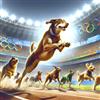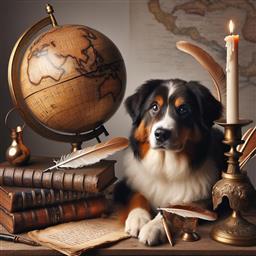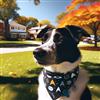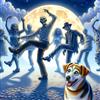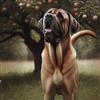1710s Dog Names - Page 5
Updated: June 28, 2024
Welcome to a unique collection of monikers that encapsulate the spirit and charm of the early 18th century. This era, filled with rich history and remarkable transformation, boasted its distinct style and language, which is beautifully reflected in the names of man's best friend. The nomenclature from this bygone era is a true combination of elegance, sophistication, and time-honored tradition.
As you browse through this distinctive list, you will unearth an array of names that were prevalent during the 1710s. These names, rooted in history, provide a nostalgic journey back in time. If you are a history enthusiast or simply love names with a vintage charm, you will find these selections fascinating. Each of these names carries a unique tale, a slice of history, a remnant of a past era, allowing your beloved pet to carry forth the spirit of the 1710s.
So, whether you are looking for a name for your new fur-baby or wish to rename your pet, this collection of names from the 1710s provides an array of interesting options. Make your selection not just a name, but a conversation piece that holds a fragment of history. Allow your pet's name to be a delightful bridge to the past, basking in the glory of the 1710s.
| Name | Reason to Choose |
|---|---|
| Steinbeck | In honor of John Steinbeck, author of 'Of Mice and Men' |
| Sterne | Laurence Sterne was a popular novelist and clergyman during the 1700s |
| Stuart | The Stuart monarchy was a significant part of English history in the 1700s |
| Swift | Jonathan Swift, the author of Gulliver's Travels, was a popular figure in the 1710s |
| Teddy | A name that reflects the affectionate nature of dogs |
| Tennyson | Alfred Tennyson was a well-known English poet often regarded as the chief representative of the Victorian age in poetry |
| Tess | A short, simple name that was popular in the 1710s |
| Thatcher | A popular trade in the 1710s and would be a unique name for a dog |
| Toby | Another example of a human name being used for dogs |
| Tolkien | A tribute to J.R.R. Tolkien, the mind behind 'The Lord of the Rings' |
| Tommy | Another example of a human name being used for dogs |
| Twain | A tribute to Mark Twain, author of 'Adventures of Huckleberry Finn' |
| Verne | A nod to Jules Verne, a pioneer of the science fiction genre |
| Vivaldi | Antonio Vivaldi was a famous Italian Baroque musical composer who was popular in the 18th century |
| Volta | Named after Alessandro Volta, a famous Italian physicist, chemist, and pioneer of electricity and power |
| Voltaire | Named after the French Enlightenment writer, historian, and philosopher |
| Whitman | A tribute to Walt Whitman, a major figure in American poetry |
| Wilde | Named after Oscar Wilde, known for his wit and literary style |
| Wolfgang | Inspired by Johann Wolfgang von Goethe, a German writer and statesman |
| Wordsworth | William Wordsworth was a key figure in the Romantic Age in English literature |
| Yeats | A tribute to W.B. Yeats, renowned Irish poet |
|
Suggest:
|
Submitted!
|
| 1 2 3 4 5 | |
Mythological Names
| Name | Description |
|---|---|
| Apollo | Named after the Greek God of the Sun, it was a popular choice for hunting dogs in the 1710s |
| Ares | 1710s dog owners, inspired by the Greek God of War, often used this name for their most fierce canine companions |
| Artemis | This name, after the Greek Goddess of Hunt, was a popular choice for hunting dogs |
| Athena | Inspired by the Greek Goddess of Wisdom, this name was often given to intelligent breeds |
| Atlas | This name, inspired by the Greek Titan who held up the sky, was often given to strong, sturdy dogs |
| Demeter | Named after the Greek Goddess of Agriculture, this name was common for farm dogs |
| Diana | This name, inspired by the Roman Goddess of the Hunt, was a popular choice for hunting dogs |
| Freya | This name, inspired by the Norse Goddess of Love, was often given to loving and affectionate dogs |
| Hades | Inspired by the Greek God of the Underworld, this name was often given to black or dark colored dogs |
| Hera | Named after the Greek Goddess of Women, this name was often given to female dogs showing motherly instincts |
| Hercules | This name, inspired by the Greek demigod known for his strength, was common for guard dogs in the 1710s |
| Juno | Female dogs were often given this name, after the Roman Goddess of Marriage |
| Jupiter | Inspired by the Roman King of the Gods, this name was often given to dogs that were seen as protectors |
| Loki | Named after the Norse God of Mischief, this name was a popular choice for playful, mischievous dogs |
| Mercury | This name, inspired by the Roman Messenger God, was common for fast and agile dogs |
| Minerva | This name, inspired by the Roman Goddess of Wisdom, was common among intelligent dog breeds |
| Odin | The name of the Norse God of Wisdom was a popular choice for intelligent breeds |
| Orion | This name, inspired by the Greek Hunter, was often given to hunting dogs |
| Osiris | Named after the Egyptian God of the Afterlife, this name was common for dogs seen as protectors |
| Perseus | This name of the legendary Greek hero was often given to dogs with a protective nature |
| Poseidon | Dogs that loved water were often given this name, after the Greek God of the Sea |
| Thor | This name, inspired by the Norse God of Thunder, was often given to large and powerful dogs |
| Venus | Named after the Roman Goddess of Love, this name was often given to affectionate dogs |
| Vulcan | Named after the Roman God of Fire, this name was common for dogs with a fiery spirit |
| Zeus | Inspired by the Greek God of Sky, this name was often given to dogs that were perceived as leaders |
|
Suggest:
|
Submitted!
|
Royal Names
| Name | Description |
|---|---|
| Alexei | After Alexei Petrovich, Tsarevich of Russia, a notable figure during this period |
| Anne | In tribute to Anne, Queen of Great Britain during the early 18th century |
| Augustus | In memory of Augustus II the Strong, king of Poland and grand duke of Lithuania |
| Caroline | Honor to Caroline of Ansbach, queen consort of Great Britain during the 1710s |
| Catherine | Named after Catherine I of Russia, an influential figure in the early 18th century |
| Charles | In memory of Charles VI, Holy Roman Emperor who held the title in the 1710s |
| Charlotte | Named after Charlotte of Mecklenburg-Strelitz, queen consort of Great Britain and Ireland |
| Constanza | After Constanza Farnese, an Italian noblewoman of the 18th century |
| Eleonore | After Eleonore of Pfalz-Neuburg, queen of the Holy Roman Empire |
| Elisabeth | Celebrating Elisabeth Christine of Brunswick-Wolfenbüttel, queen of Prussia |
| Eugene | In tribute to Prince Eugene of Savoy, a significant figure in the early 18th century |
| Ferdinand | In honor of Ferdinand Maria Innocenz of Bavaria, an influential archbishop |
| Frederick | After Frederick I of Sweden, an active monarch in the 18th century |
| Friedrich | In tribute to Friedrich Wilhelm I of Prussia, who ruled during the 1710s |
| George | Inspired by George I of Great Britain, who was king during this period |
| Joseph | For Joseph I, Holy Roman Emperor in the 1710s |
| Leopold | Paying homage to Leopold I, who was the Holy Roman Emperor during the early years of the 18th century |
| Louis | Named after Louis XV of France, who began his reign in 1715 |
| Maria | For Maria Theresa of Austria, an influential queen regnant of the time |
| Maximilian | In tribute to Maximilian II Emanuel, Elector of Bavaria during the period |
| Peter | In memory of Peter I of Russia, also known as Peter the Great |
| Philip | Paying homage to Philip V of Spain, who reigned in the early 18th century |
| Philippa | Named after Philippa of England, queen of Denmark, Sweden and Norway |
| Sophia | To honor Sophia Dorothea of Celle, queen consort of Prussia |
| Wilhelmina | After Wilhelmine Amalia of Brunswick-Lüneburg, queen of the Holy Roman Empire |
|
Suggest:
|
Submitted!
|
Geographical Names
| Name | Description |
|---|---|
| Antwerp | The city was a major European hub of commerce and culture |
| Athens | The city was a symbol of ancient civilization in the 1710s |
| Berlin | The city was growing rapidly as the capital of Prussia |
| Boston | The city was undergoing rapid expansion in the 1710s |
| Bristol | The city was a major port for colonial trade in the 1710s |
| Cairo | Egypt's thriving city in the 1710s |
| Delhi | It was the Mughal capital in the 1710s |
| Edinburgh | The Scottish Enlightenment started in the 1710s |
| Geneva | Geneva was a city known for enlightenment ideas |
| Istanbul | It was the capital of the Ottoman Empire during the 1710s |
| Lisbon | The Portuguese capital was cosmopolitan in the 1710s |
| London | It was a flourishing city in the 1710s |
| Madras | Chennai, formerly known as Madras, was a significant British colony in the 1710s |
| Manila | The city was the capital of the Spanish East Indies |
| Moscow | The city was the capital of the expanding Russian Empire |
| Mumbai | The East India Company was prominent in the city during that era |
| Nile | The river was significant to Egyptian civilization |
| Oslo | The Norwegian city was establishing its independence in this era |
| Rome | The city was the heart of Catholicism in the 1710s |
| Seville | The city was an important Spanish port in the 1710s |
| Sydney | Named after Lord Sydney, who was in power in England during the 1710s |
| Venice | The city was a hub for art and culture in the 1710s |
| Versailles | It was the royal residence in France during the 1710s |
| Vienna | The city was a major center of music in the 1710s |
| York | The city was important during the period |
|
Suggest:
|
Submitted!
|
Literature Inspired
| Name | Description |
|---|---|
| Behn | Inspired by Aphra Behn, one of the first professional female writers |
| Candide | The title character in Voltaire's 'Candide' from 1759 |
| Cervantes | After Miguel de Cervantes, author of 'Don Quixote' |
| Clarissa | From 'Clarissa, or, the History of a Young Lady' by Samuel Richardson, published in 1748 |
| Crusoe | Taken from 'Robinson Crusoe' by Daniel Defoe, a novel from 1719 |
| Defoe | Named after Daniel Defoe, author of 'Robinson Crusoe' |
| Fanny | The title character in 'Fanny Hill' by John Cleland, published in 1748 |
| Fielding | After Henry Fielding, an influential novelist in the 1700s |
| Friday | Crusoe's loyal friend in 'Robinson Crusoe' |
| Goldsmith | In honor of Oliver Goldsmith, an Irish novelist and playwright |
| Gulliver | Inspired by 'Gulliver’s Travels' by Jonathan Swift, published in 1726 |
| Lemuel | The protagonist's first name in 'Gulliver’s Travels' |
| Moll | Inspired by 'Moll Flanders' by Daniel Defoe, published in 1722 |
| Orlando | The title character in 'Orlando: A Biography' by Virginia Woolf, published in 1928 |
| Pamela | A nod to 'Pamela, or Virtue Rewarded', a novel from 1740 |
| Quixote | The protagonist in 'Don Quixote' |
| Richardson | After Samuel Richardson, author of 'Clarissa' |
| Roxana | A character in 'Roxana: The Fortunate Mistress' by Daniel Defoe, a novel from 1724 |
| Sancho | Inspired by Sancho Panza, a character in 'Don Quixote' |
| Smollett | Named for Tobias Smollett, a Scottish poet and author |
| Sterne | After Laurence Sterne, author of 'Tristram Shandy' |
| Swift | In honor of Jonathan Swift, author of 'Gulliver’s Travels' |
| Tristram | Inspired by 'The Life and Opinions of Tristram Shandy, Gentleman', a novel from 1759 |
| Voltaire | In honor of Voltaire, author of 'Candide' |
| Woolf | After Virginia Woolf, author of 'Orlando: A Biography' |
|
Suggest:
|
Submitted!
|
Historical Figures
| Name | Description |
|---|---|
| Bach | Recognized for Johann Sebastian Bach, a famous composer and musician |
| Berkeley | George Berkeley was a notable Irish philosopher during this era |
| Copernicus | Nicolaus Copernicus was a mathematician and astronomer who proposed a heliocentric model of the universe |
| Defoe | Daniel Defoe, an English trader and author, was active in the 1710s |
| Descartes | René Descartes' contributions to philosophy were significant during the 17th century |
| Dryden | John Dryden was a influential English poet, literary critic, and playwright |
| Galileo | Named after Galileo Galilei, a preeminent scientist of the 17th century |
| Gay | John Gay, an English poet and dramatist, was popular in the 1710s |
| Handel | George Frideric Handel was a renowned composer of this era |
| Haydn | Joseph Haydn was a prominent composer of the Classical period |
| Hobbes | Thomas Hobbes, an English philosopher, was a prominent figure in this period |
| Hume | Inspired by David Hume, a Scottish Enlightenment philosopher |
| Leibniz | Gottfried Leibniz, a German philosopher and mathematician, was active during this period |
| Locke | John Locke, an influential Enlightenment thinker, was widely recognized during this time |
| Montesquieu | Inspired by the French judge, man of letters, and political philosopher |
| Mozart | Wolfgang Amadeus Mozart was a legendary composer of the Classical period |
| Newton | Isaac Newton was a prominent scientist during the 17th century |
| Pepys | Samuel Pepys, an English administrator and Member of Parliament, was well-known during the 17th century |
| Purcell | Henry Purcell, a famous English composer, was active in the late 17th century |
| Rousseau | This name is inspired by Jean-Jacques Rousseau, a philosopher from the 18th century |
| Spinoza | Baruch Spinoza's philosophy held significant influence in the 17th century |
| Swift | Named after Jonathan Swift, an Anglo-Irish satirist, essayist and political pamphleteer |
| Vivaldi | Antonio Vivaldi was a renowned composer in the 18th century |
| Voltaire | A French Enlightenment writer, historian, and philosopher |
| Wren | Sir Christopher Wren was a celebrated English architect of the late 17th and early 18th centuries |
|
Suggest:
|
Submitted!
|
User Submitted Images
There are currently no user submitted images for this page. This is your opportunity to be the first! Submit your photo below.
User Recommendations
There are currently no name recommendations for this page. This is your opportunity to be the first! Make your recommendation below.
Recently Updated
We would like to take this time to thank all of our visitors that make DogNamed.com the best dog naming resource on the web. Our site would not be where it is today without your suggestions, ratings, and photo submissions. So pat yourselves on the back for a job well done and keep up the good work! If you have any comments, suggestions, or ideas for the this page or any part of our site, don't hesitate to drop us a line on our Contact Page. Thank you! -The DogNamed Team


